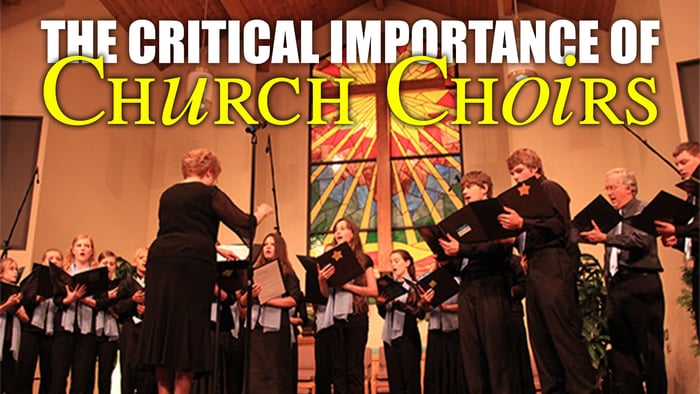
Is the verdict final? Are church choirs going the way of pay phones and Blockbuster video stores?
The evidence seems pretty convincing. . .
From 1998 to 2012, 21% of evangelical churches and 40% of mainline churches stopped using choirs regularly in worship (according to the most recent National Congregational Study).
That said, of the 200,000 evangelical and mainline Protestant churches in North America, 35% of evangelical congregations and 37% of mainline churches continue to use choirs—a total of approximately 70,000 churches.
That’s still a lot of folks who believe in the critical importance of church choir in their worship services.
As an attorney, I’m trained to prepare arguments and present evidence. Ladies and gentlemen of the jury, here are eight reasons a choir can be vital to your church.
- Choirs are biblical.
It’s easy to miss, but the Book of Psalms is filled with detailed notes to the music director explaining the style, the melody, and the occasion of a particular song. Old Testament worship was led by great numbers of trained singers and musicians. And the Psalms were the hymnal of the New Testament church.
This is not to say that choirs are the only valid scriptural model for worship, but to dismiss choirs altogether as archaic and irrelevant means we risk forsaking a rich biblical tradition.
- Choirs encourage excellence in worship.
A choir rarely performs “off the cuff.” Rather, the director spends time and resources finding the perfect arrangement of the perfect song. Then, the director spends time rehearsing singers and musicians to perform the song with beauty and precision. Choir members learn the parts and hopefully transcend the notes on the page—allowing the song to speak to and through them to the congregation. Ideally, a “performance” piece inspires people to praise. Likewise, using the choir for congregational songs is a powerful prompt to worship: people clearly hear the melody and join their voices as one. A practiced choir encourages a sense of awe and reverence through their excellence and preparation.
- Choirs celebrate the human voice.
There is something extraordinary about hearing a group of practiced singers use their God-given instruments to worship their Creator. I remember the first time I ever heard a gospel mass choir. The summer before I went to college, I attended a community talent show at Woodrow Wilson High School in Portsmouth, Virginia. There were folk singers and rock bands and soloists. Then the choir took the stage. About ten seconds after they started singing, every hair on my head stood up. I had goosebumps on my goosebumps. The sheer intensity and emotion of those voices eclipsed any of the prior performances. We were on our feet, singing along—transformed from spectators into participants. Their rich, passionate voices touched something deep within us. And in doing so, they connected our hearts to our Father’s.
- Choirs can inspire and lead worship.
One of the arguments against using choirs in contemporary worship services is that it relegates congregants to the role of bystanders. As if we’re saying, “Let the professionals do the worshiping—you just sit here and enjoy it.” Instead—the argument continues—we ought to make congregational singing as simple and inviting as possible. So we do away with hymnals that have written harmony parts and simply project lyrics on the screen to be sung in unison. But this great “dumbing down” doesn’t necessarily encourage more participation. You don’t have to look far to find modern worship settings where people are “spectating” just as much as they might have done with a choir.
The issue isn’t as much if a choir should be used; rather, it’s how a choir can be used to facilitate meaningful worship. Yes, it’s possible to make your choir (or worship band, for that matter) the center of attention. But that’s “worship malpractice” insomuch as it misdirects your congregation away from the true object of worship, the Lord. But properly used, a choir (or worship band) can lead your congregation to worship in Spirit and in truth.
- Choirs can be redemptive communities.
We live in the age of the superstar worship leader and celebrity pastor. Choirs can be an antidote to this spiritual epidemic. A healthy choir affirms all its members—not just the high-profile ones. A choir can be a redemptive community where all the imperfect parts of the Body of Christ are cherished—especially when someone is going through a tough time. A choir is a place where you belong, where you are missed when you’re not there, and where you can contribute your modest talent so that the whole can be greater than the sum of its parts.
Effective directors treat their choirs as “a ministry within a ministry.” They take time to share devotional thoughts, prayer requests, and pot-luck dinners. Like the fabled bar in the TV show Cheers, their choir is a place “where everyone knows your name.” This is especially important in larger churches, where it’s easy to remain anonymous, or worse, overlooked.
- Choirs make us work together.
Similarly, the American archetype is that of uncompromised individualism. We resist being woven into the fabric of a community—especially one where we must constantly subjugate ourselves to a leader and submit our talents to one another.
Choirs can help cure the disease of self-centeredness. To succeed, we must yield ourselves to one another. We must listen to each other. We must follow the leader’s direction. Looking away for even a moment can be embarrassing. Straying from the notes can be disastrous. Choirs teach us mutuality and submission within the context of an endeavor greater than ourselves.
- Choirs can encourage musical diversity.
Most “choir folks” are more musically diverse than you’d think. They appreciate lots of different styles of music because—somewhere along the way—they had a choir director who made them sing a hymn in German or an early American folksong or an a cappella arrangement of a pop song from the radio. Yes, choir nerds can be a little snooty, but I’ll bet they’re fans of music from several centuries and not just a certain decade.
In contrast, most of the top modern worship songs on CCLI’s chart were written in the past 20 years. I’ll go out on a limb and say that folks who sing in choirs are often more musically eclectic than those who lead worship bands. If we’re going to move beyond the “worship wars” of the past few decades and embrace the “Both/And of Worship,” we’re going to have to stop pandering to the mind-numbing sameness of music made by and for people just like us. The Church is bigger than one style, and making a choir part of your worship experience can help your congregation resist the temptation of homogeneity.
8. Choirs teach the art and discipline of music.
We're all too aware that many public schools have had to cut their arts and music offerings in order to fund basic match, science, and language programs—even though research shows that musical training helps children with their cognitive and social growth. The consequence is that most young people don't have the opportunity to learn to sing or play an instrument, must less learn how to read music. In many cases, the local church—through its children's, teen, and adult choir programs—may be the only place where young people (as well as older people) can learn the discipline of music without having to pay for lessons. [Check out this article on 10 Steps to Launch Your Own Singing School.]
And in closing...
And so, ladies and gentlemen of the jury, I close by appealing to the witness of Scripture, to the majestic power of disciplined voices in song, to the spiritual benefit of being part of a redemptive community, and to the richness that comes from diversity in worship.
I ask that you render a verdict in favor of the importance of church choir program in your local church.
Support your choir director—or recruit one if you don’t have one. Set aside funds to build a library of great music. Celebrate your choir every time they sing.
I rest my case.
---
In the interest of full disclosure, I must confess that—in my work for DiscoverWorship.com—my job is to help provide excellent biblical, singable, and affordable music to choir directors and worship leaders. Several years ago, my friend Regi Stone took me to breakfast and shared how he’d helped build an online subscription service with more than 2000 pieces of church music that could be searched, fully previewed, instantly downloaded, and copied for singers and musicians. Regi knew I had experience creating and marketing faith-based music, and ever since then I’ve had the honor of helping churches—especially smaller and under-resourced congregations—discover great music for their choirs and worship teams.
For all of the above-mentioned reasons, being part of a choir has literally changed my life. I believe that same life-changing experience should continue to be part of the life of the church.
--For more helpful articles about church music and worship service planning, check out www.discoverworship.com and these articles:
- 3 Steps Every Choir Director Should Take Now
- Improving Your Choir by Building the Blend
- 5 Things to Remember for Your Choir Rehearsal
- What's Better: Traditional Church Choir or Worship Team?
- 3 Ways to Cultivate Spirit-Led Worship
- Is There One Best Way to Format a Worship Set?
- How Often Should We Introduce New Congregational Worship Songs?
- Leading Worship Through Song List Curation
- 5 Tips to Grow Your Church Choir
- The Wrong Key (and How to Find the Right One!)
- Is It Too Loud? (Accompaniment vs. Worship Emersion Culture)
- 8 Simple Hacks to Prevent Last Minute Choir Music Panic











